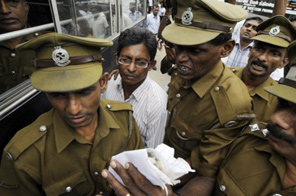SL journo jailed for 20 years
COLOMBO: A Sri Lanka court sentenced a Tamil reporter, cited by US President Barack Obama as an "emblematic example" of a persecuted journalist, to 20 years in prison Monday on charges of supporting terrorism.
J.S. Tissainayagam, 45, who contributed to the local Sunday Times and ran a website, Outreachsl.com, that focused on the island's minority Tamils, was found guilty on three counts under the Prevention of Terrorism Act (PTA).
A court official said the charges included receiving money from the rebel Liberation Tigers of Tamil Eelam (LTTE) to fund his website and causing racial hatred through his writings about Tamils affected by the conflict.
Obama mentioned Tissainayagam in his May 1 World Press Freedom day statement describing him as an "emblematic example" of a journalist who was being persecuted for doing his work. Sri Lanka said Obama had been misinformed.
A large number of journalists and media rights activists were in court when the surprise judgement was delivered after a nearly year-long trial.
Rights activist and lawyer Nimalka Fernando said the High Court ruling was a direct assault on freedom of expression in Sri Lanka and slammed the judicial system for stifling the media.
"This is a travesty of justice. This is a direct attack against freedom of expression. I may be hauled up for contempt for saying this but I don't mind because someone has to say it.
"I am appalled and saddened that Sri Lanka is closing its doors to international standards relating to freedom of expression," she said.
She said Tissainayagam should be treated as a political prisoner.
Tissainayagam has been in custody since his arrest in March 2008 despite appeals by local and international media rights groups for his release.
"He becomes the first journalist to be convicted and sentenced under the PTA," the head of the local Free Media Movement Chulawansa Srilal said, adding they were stunned by the court ruling.
The PTA was introduced three decades ago during the early stages of the Tamil separatist campaign.
The Hong Kong-based Asian Human Rights Commission said it was not surprised by judgement. It said Colombo had wanted to "send a message to society" that "freedom of expression does not matter at all".
"That was the real aim of this case. It is the sort of prosecution that could have happened under the regime of Joseph Stalin," the group said in a statement.
Tissainayagam's lawyers said they will appeal the conviction.
Defence authorities contended Tissainayagam received funding both directly and indirectly from the Tigers who were defeated by government forces in May.
The court accepted a confession from the journalist about his alleged involvement with the Tigers despite protests from his lawyers who questioned its authenticity.
The arrest of Tissainayagam came amid a climate of fear among Sri Lankan journalists, several of whom have been killed by unidentified groups.
A leading anti-establishment editor, Lasantha Wickrematunga, was shot dead near his office in January. Several others have escaped assassination.
Government figures show nine journalists have been killed and another 27 assaulted in the past three years while activists say over a dozen journalists have been killed.
Independent defence analysts stopped writing or quit the country at the height of fighting between troops and rebels, even though there was no formal censorship.
The United Nations estimates between 80,000 and 100,000 people were killed in the decades-long conflict which ended after the military took control of all rebel-held territory and killed the group's leader Velupillai Prabhakaran.
The government still restricts media access to the regions where 300,000 war-displaced civilians are held in government-run camps.






